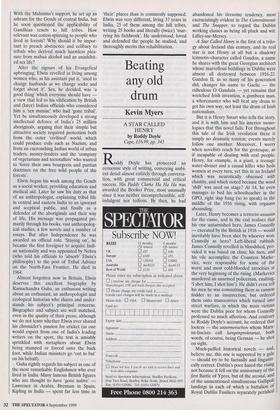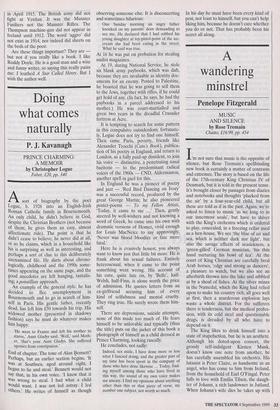Beating any old drum
Kevin Myers
A STAR CALLED HENRY by Roddy Doyle Cape, £16.99, pp. 343 Roddy Doyle has pioneered an economic style of writing, conveying ambi- ent detail almost entirely through conversa- tion, with great commercial and critical success. His Paddy Clarke Ha Ha Ha was awarded the Booker Prize, most unusually since it was neither incomprehensible, self- indulgent nor tedious. By then, he had abandoned his tiresome tendency, most excruciatingly evident in The Commitments and The Snapper, to regard the Dublin working classes as being all pluck and wit: Liffey-sur-Mersey.
A Star Called Henry is the first of a trilo- gy about Ireland this century, and its real star is not Henry at all but a shadowy leitmotiv-character called Gandon, a name he shares with the great Georgian architect whose marvellous buildings in Dublin were almost all destroyed between 1916-22. Gandon II, as so many of his generation did, changes his name to Gaelic — the ridiculous 0 Ganduin — yet remains that wretched Irish invention, a gombeen man, a whoremaster who will beat any drum to get his own way, not least the drum of Irish nationalism.
But it is Henry Smart who tells the story, and it is with him and his interior mono- logues that this novel fails. For throughout this tale of the Irish revolution there is simply no dramatic tension; events merely follow one another. Moreover, I worry when novelists reach for the grotesque, as if incapable of dealing with real people. Henry, for example, is a giant, a teenage water-diviner and a casual killer who beds women at every turn, yet this in an Ireland which was neurotically obsessed with chastity, and which rioted because the word `shift' was used on stage? At 14, he even manages to bed his schoolteacher in the GPO, right slap bang (so to speak) in the middle of the 1916 rising, with orgasms abounding.
Later, Henry becomes a terrorist-assassin for the cause, and in the end realises that his one untarnished hero, James Connolly — executed by the British in 1916 — would inevitably have been shot by whoever won. Connolly as hero? Left-liberal rubbish. James Connolly revelled in bloodshed, pro- vided it was based on class; his men, and his vile accomplice the Countess Marke- vicz, were responsible for some of the worst and most cold-blooded atrocities at the very beginning of the rising. (Markevicz murdered an unarmed policeman, exulting, `I shot him, I shot him'). He didn't even tell his men he was committing them as cannon fodder to an insurrection, but ordered them onto manoeuvres which turned into street warfare, in which the main victims were the Dublin poor for whom Connolly professed so much affection. And contrary to Roddy Doyle's account, he ordered that looters — the untermenschen whom Marx- ist-fascists call lumpenproletariat, both words, of course, being German — be shot on sight. Much-puffed historical novels — and, believe me, this one is supported by a gale — should try to be factually and linguisti- cally correct. Dublin's poor hated the rising not because it fell on the anniversary of the first Battle of Ypres, but of the second, and of the unmentioned simultaneous Gallipoli landings in each of which a battalion of Royal Dublin Fusiliers separately perished in April 1915: The British army did not fight at Verdun. It was the Munster Fusiliers not the Munster Rifles. The Thompson machine-gun did not appear in Ireland until 1912. The word 'aggro' did not exist in 1914, nor indeed did sheets on the beds of the poor.
Are these things important? They are but not if you really like a book. I like Roddy Doyle. He is a good man and a wise and funny writer, so saying this really pains me: I loathed A Star Called Henry. But I wish the author well.



























































 Previous page
Previous page